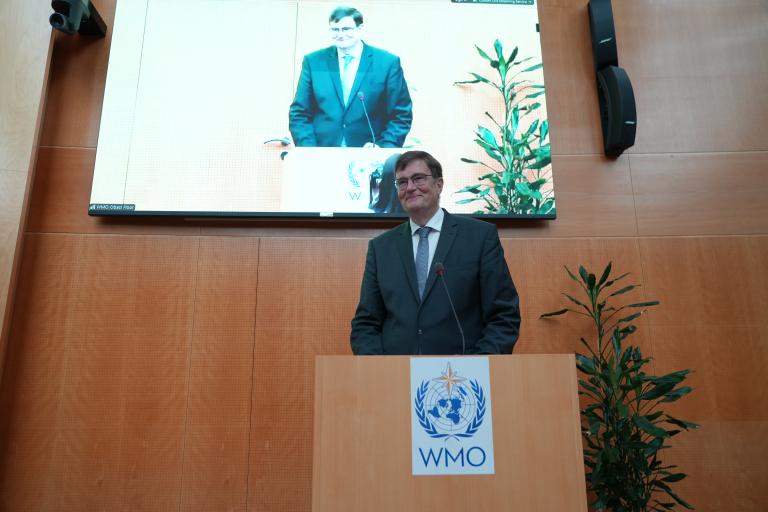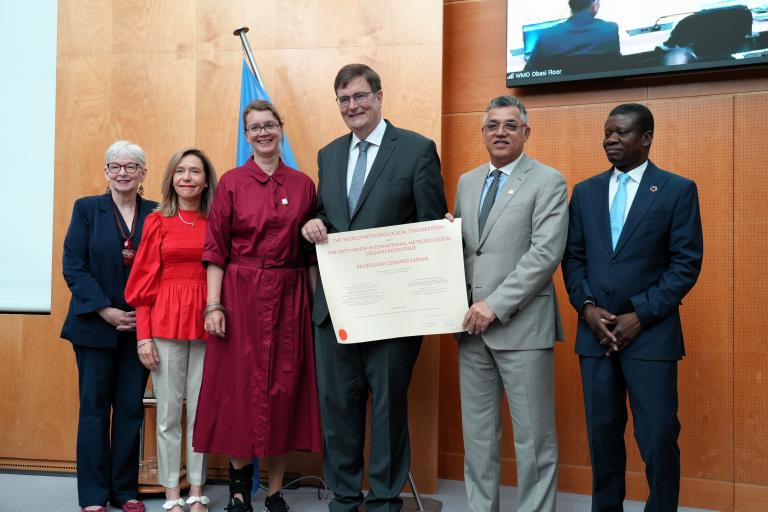Advances in weather forecasting exceeded expectations, says IMO Prize winner Gerhard Adrian

The vast advances of numerical weather forecasting over the past five decades have exceeded all expectations, leading to improved warnings and services to society and laying the base for future progress in an era of Artificial Intelligence, says Prof. Gerhard Adrian, the winner of the World Meteorological Organization’s top award.
The quality of forecasts over a range of one week today is as good as the forecast over a range of one day 50 years ago, said Gerhard Adrian, former President of the German Weather Service (DWD) and past President of WMO.
“I never expected such a progress in weather forecasting I have experienced up to day,” he said in his lecture at the IMO Prize ceremony. He recalled that when he finished university in 1975, the scientific question was whether weather forecasts beyond day two were possible.
“The question was positively answered,” he said in his presentation entitled “Following 50 Years of the Evolution of Numerical Weather Prediction from my personal perspective.”
The IMO Prize (named after WMO’s predecessor, the International Meteorological Organization) is the equivalent of a Nobel prize for meteorologists and honors outstanding work in meteorology and hydrology and contributions to international collaboration. It was established in 1955 and symbolizes the advancements that have been made in meteorology over the years.
“It is not just a medal or a title. The IMO Prize is the recognition of a lifetime of dedication,” said WMO President Dr Abdulla Al Mandous. “It is a reaffirmation of the ideals that guide our work: scientific integrity, multilateral cooperation, and service to society,” he said.
“Each laureate of this prize reminds us that science, when practiced with purpose and humility, can be a unifying force. Gerhard's name will now stand alongside those who have laid the very foundations of modern meteorology. And through this award, we reaffirm our collective aspiration to advance science in the service of humanity,” said Dr Al Mandous.

A legacy built on trust
Gerhard Adrian was President of the German national meteorological service, Deutscher Wetterdienst, from 2010 to 2023 and was WMO President from 2019 to 2023. He was also President of the Council of the European Centre for Medium-Range Weather Forecasts (ECMWF) and Chair of Policy Advisory Committee of the European Organization for the Exploitation of Meteorological Satellites (EUMETSAT).
“If I had to choose one word to describe Gerhard’s legacy, it would be trust,” said WMO Secretary-General Celeste Saulo.
“Trust that stems from knowledge—solid, extensive, always precise. Trust that comes from a leader who listens carefully, speaks with intention, and brings people together.
“And above all, trust that comes from someone who has always cared deeply—for our Members, for the Secretariat, and for the future of our Organization,” she said.
She recalled that one of the pivotal moments of his WMO Presidency was the extraordinary session of the World Meteorological Congress in 2021.
“Gerhard stood at the helm and strategically guided the approval of the WMO Unified Data Policy. This was not only a milestone for the WMO—it was a bold step forward for the global scientific community. Gerhard’s clarity and unwavering commitment to open access helped transformed a long-held vision into reality,” she said.
“This was at a time when we were grappling with the COVID-19 pandemic. His diplomacy was crucial at an online event which offered no chance for corridor discussions and networking.”
Advances in numerical weather prediction
At DWD, Gerhard Adrian was a figurehead for operational and scientific advancement. He fostered the integration of research and operations, prioritized climate services, and championed innovation—while never losing sight of the human dimension of our work. As a result, DWD is a role model for excellence and for regional and global cooperation.
In his lecture, Gerhard Adrian recalled the long history of NWP and the sequential developments in each era over the decades, as well as the forecasting challenges posed by severe weather systems due to deep convection.
DWD was a founder member of COSMO, short for the Consortium for Small-scale Modelling - a collaboration of national meteorological and hydrological services (NMHSs) and their research partners which also benefited NMHSs in developing countries.
To meet the demands on NWP in the 1990s, DWD developed a new Global Model to replace not only a previous global model but also a limited-area model LM. Additionally, the DWD introduced a new nonhydrostatic model LM with the resolution enabling the simulation of deep convections and focusing on small-scale weather forecasts over limited geographical areas. The LM was developed by COSMO.
These were subsequently replaced by the ICON (Icosahedral Nonhydrostatic) Model), which is unified atmospheric modeling system which combines global and regional weather prediction capabilities into a single, integrated system.
The ICON modelling framework has been developed to a unified system for very different global and limited area applications for weather forecasting and climate prediction in DWD as well in the COSMO consortium, for research applications in climate, atmospheric dynamics on all scales, air chemistry, carbon cycle, or air pollution modelling.
Artificial Intelligence has advanced at such rapid speed in the past two years that DWD currently has a pre-operational AI-based model which is due to become operational later this year, said Prof. Adrian.
IMO Lecture: Gerhard Adrian reflects on 50 years of Numerical Weather Prediction

